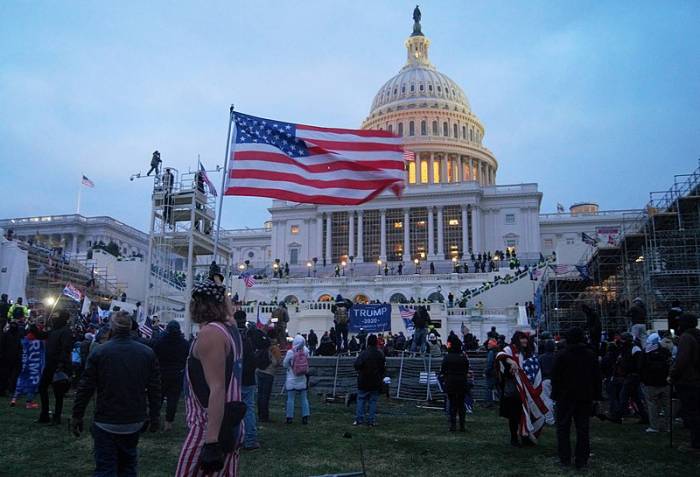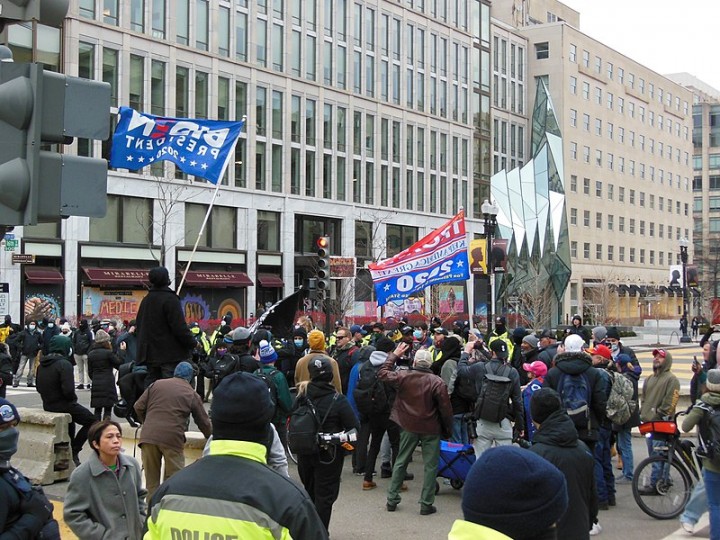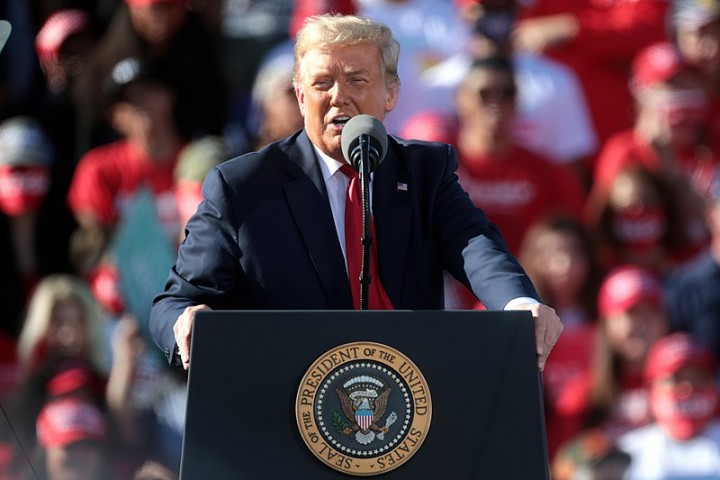
2021 has kicked off with a bang. If anyone had any remaining doubts, the events of Jan. 6 exposed the depth of the crisis of US capitalism—and it is only the beginning. Even in the turbulent years before and after the US Civil War, we have never seen the US Capitol building breached by protesters—and encouraged by the sitting president! Anti-terrorist attack emergency protocols were activated as tear gas wafted through the corridors, and at least one person was shot and killed. former president GW Bush put it, these are the scenes one would expect in a “banana republic”—i.e. in a country ravaged by US imperialist intervention, not in the belly of the beast itself.
American capitalism and its institutions are like a house riddled with termites—and the rot is spreading quickly. It may appear structurally sound on the surface, but if you step on the porch, your foot will punch through the floor. Dialectics explains that things turn into their opposites. For decades, the US was the most steady and stable of the major capitalist countries. Now, the whole world watches as right-wing protesters run riot in one of the three most important federal government buildings. Like a Potemkin village, the “almighty” institutions of the American government have been exposed as much weaker and feebler than they appear.
The fundamental crisis of the capitalist mode of production has led to tremendous social instability and decline in the “citadel” of world imperialism. This is reflected in sharp polarization combined with massive political confusion. The distorted divisions within the working class result from the impasse of capitalism and the lack of a bold class-independent political and trade union leadership. If the working-class anger pent up over decades had been directed into building a new mass party and harnessing the unions’ power to fight for all workers’ interests on a class basis, 2020 and today’s situation would be completely different.
We have seen many sharp and dramatic changes in recent years, and there are many more to come. The chaos, confusion, and lack of adequate leadership of the situation present many obstacles for the working class. But it also opens many opportunities. Lenin explained that the first condition that indicates society is entering a pre-revolutionary period is that the ruling class is divided and can no longer rule in the traditional way. We would have to go back to the Antebellum years to find a time when the ruling class and its politicians were as bitterly divided as they are today.
Time and again, over the last few hundred years, we have seen that when the ruling class is paralyzed and at odds, the masses sense an opportunity and storm into the breach in an attempt to bring about a fundamental change. However, what we saw on Jan. 6 was not the working masses rising up to seize their destinies to change society. Despite their delusions of revolutionary grandeur, the Confederate-flag-waving participants were the furthest thing from revolutionary. This was a counterrevolutionary mob that sensed an opportunity to upset the apple cart by storming a key institution of world-imperialist reaction in an attempt to push it even further to the right.
Chaos on Capitol Hill
It was widely anticipated that January 6, the day Congress was scheduled to certify the Electoral College vote in a joint session, would be a tense day in Washington. This was the culmination of Trump’s attempt to frame the election as fraudulent, and the president organized a “Save America March” to coincide with the Electoral College vote.
The rally brought out several thousand of his most fervent supporters, many of whom traveled from rural counties across the country, including hundreds of armed militiamen, Proud Boys, and other reactionary elements of the extreme right.
The same Trump who so vehemently opposed the Black Lives Matter movement and went so far as to demand a military clampdown in June now addressed a small ocean of MAGA hats, American flags, Trump banners, Confederate flags, and Blue Lives Matter flags. He called on his supporters to march on Pennsylvania Avenue and show their anger at the US Congress. Trump’s personal lawyer Rudy Giuliani called for a “trial by combat.”
Instead of the militarized scenes of riot police and National Guard troops patrolling every building and street corner in Washington during the Black Lives Matter protests, the police presence ranged from totally unprepared to openly sympathetic. They certainly did not have the numbers and equipment they used against the BLM protesters, despite the very public planning of violent actions on right-wing websites in the weeks leading up to the march.
Shortly before 2 pm, just as pro-Trump members of Congress were objecting to the Arizona electoral vote certification, the crowd outside the Capitol building swept past the paltry police barricades and swarmed the government building, scaling walls and shattering windows. The breaking news flooded global headlines as millions watched the mob leap through the windows and march down the halls of the Capitol, while Senators crouched on the floor and were hurried to protected chambers.
The protesters poured into the building, bringing the Congressional session to a halt. They proceeded to occupy and ransack legislators’ offices, including Speaker Pelosi’s office, whose correspondence and placards were seized as trophies. Tear gas was used, and the FBI and other armed agents were called in to retake the building. The entire Washington DC National Guard, a force of 2,700 troops, and 650 Virginia National Guards were mobilized to restore order. Several hours later, New York governor Cuomo dispatched an additional 1,000 New York National Guard troops to help bring calm to Capitol Hill. There were also small sympathetic pro-Trump demonstrations and invasions of government buildings in a handful of state capitals around the country, though nothing on the level of the DC protests.
Trump and his diehard supporters in Congress almost certainly did not plan for the crowd to invade the Capitol—but they were playing with fire. Trump had warmly encouraged the extreme right when it marched through Charlottesville, Virginia. In the presidential debate in the fall, he infamously told the Proud Boys to “stand back and stand by.” Tired of standing by, Trump’s attack dogs broke free of their leashes and ran snapping and snarling to smite their master’s enemies.
Was this an attempted Bonapartist coup?
To be sure, these are dramatic events! But as Marxists, we must maintain a sense of proportion. This was not an organized insurrectionary coup on the verge of overthrowing the US government and imposing a fascist regime to crush the workers and the left. Far from it! The working class remains the overwhelming majority in this country and could sweep this garbage aside with its little finger once mobilized to fight in its own interests.
Bonapartism, named after Napoleon Bonaparte, can arise in society after a period of profound and prolonged instability when the class struggle has led to an impasse and mutual exhaustion. In such circumstances, individuals may emerge who appear to rise above the classes, maneuvering and leaning first on one class or layer and then another, reimposing order and the “rule of the sword” with the support of the state apparatus.

To achieve this, the would-be Bonapartist must have the support of significant sections of the military. Trump does not have this. Just three days earlier, all ten living former Defense Secretaries published a joint statement in the Washington Post defending the election results and warning that military involvement in the election would “would take us into dangerous, unlawful and unconstitutional territory.” If the military were to be called in, it would be to get rid of Trump, not to install him as dictator!
The Proud Boys, “Q-Anon” conspiracy theorists, and the rest of the far-right are not enough to establish a dictatorship, nor are they a part of the state apparatus (although some individual members are certainly in the military and police). Even without organization and leadership, these numerically insignificant and poorly organized social forces could be smothered quickly through mass working-class action—though there is no question they can do real damage on an individual scale and that even a little cancer can metastasize into something far deadlier if not treated early on. However, this threat is only a realistic perspective if the working class fails to take power over the next decade or two, and only after a series of serious defeats. A move by the “whip of counterrevolution” in this direction at this stage would create even more instability and would awaken the working class.
An unequal and opposite reaction is being prepared—unequal because the forces for social progress far outnumber the retrograde pogromists in American society. The majority of millions who participated directly in the George Floyd movement or supported its demands and actions from home are the real revolutionary future for this country. It is only a matter of time before the movement goes back on the offensive on an even higher level.
The wild and wonderful world of Donald Trump and the divisions in the Republican Party
The education system, bourgeois politicians, mainstream media, Church, and other institutions of capitalist rule barrage us with the mantra that America is the most democratic country that exists or has ever existed. Marxists do not accept these banalities. We must examine the world as it really is.
Although inadvertently, Trump has actually helped to expose the truth. Leaving aside the billions in corporate campaign donations and armies of well-heeled lobbyists, American “democracy” is not based on the concept of “one person, one vote.” Ultimately, what the majority of the people think and want has no direct bearing on government policy. Decisions made by all three government branches are ultimately taken in defense of and within the confines of the capitalist system. In times of economic and social crisis, this gives them precious little room to maneuver.
The capitalist class is concerned, above all, with the interests of the system as a whole, now and in the future. They understand that if people believe they actually have a say, they are more likely to accept the dictates of big business. But a deep-seated distrust of the status quo is permeating both the left and the right. As more and more people begin to see the way things really are, the less stability there is for maintaining capitalism and the greater prospects for a change in the system.

But Trump cares only about his immediate self-interest. His egomaniacal behavior is tearing down the curtains that have long hidden the reality of class dictatorship from the majority. This is the root of the ongoing conflict between Trump and the majority of the ruling class he himself belongs to.
Trump has actively undermined the legitimacy of the US electoral system since he first announced his presidential candidacy. Although he won the Electoral College vote and the presidency in 2016, he lost the popular vote by three million. Not content with besting his many humiliated adversaries and becoming the most powerful human on the planet, he insisted there was massive voter fraud and claimed that he had won the popular vote as well. In the run-up to the 2020 election, he asserted that the only way he could lose was through massive fraud, and he refused to promise he would facilitate a peaceful transfer of power.
Since November, Trump has surrounded himself with advisors who feed into his delusion of massive fraud. After Chris Krebs, a Republican appointed to monitor election-related technological security, vouched for the election results’ validity, he was unceremoniously fired. Even Attorney General William Barr—a Trump soldier if there ever was one—was sent packing when he stated publicly that he did not see any evidence of significant fraud.
Trump’s “respect” for the voters’ will was evident in his recent phone call to Georgia’s Secretary of State, Brad Raffensperger. Despite being a right-wing Republican and Trump supporter, Raffensperger oversaw the presidential election in Georgia and defended the vote count, although it indicated Biden had won. Trump demanded that Raffensperger “recalculate” and “find” the 11,780 votes he needed to tip the balance.
Trump’s determination to fight and stay in the White House has served to exacerbate the deep divisions in the Republican Party. These divisions were papered over after he steamrolled the party establishment in 2016, and the party was held together and even strengthened by his overwhelming gravitational force. Even in defeat in 2020, he held the party in thrall. But his sore-loser temper tantrum has finally forced many to choose sides: for or against the fundamental institutions of capitalist rule.
As for the capitalist class, which generally never saw Trump as a reliable representative of their class interests, they are now voicing their disapproval of the president more forcefully than ever. This includes the US Chamber of Commerce, historically the voice of big business, and the National Association of Manufacturers (NAM), representing 14,000 major corporations. NAM urged Vice President Pence to “seriously consider” impeaching Trump before he can complete the final two weeks of his term. Even the New York Post—a mouthpiece of Rupert Murdoch—which supported Trump through thick and thin, eventually called on him to accept the election results.
The way forward
In the midst of a pandemic and economic slump, we cannot lose sight of labor’s immense potential power. The working class is the overwhelming majority of the country, and without it, nothing is produced or transported. Not only is the working class capable of bringing the capitalist economy to a halt, but it is also the only social force that can defeat Trumpism and fundamentally transform society.
Labor should be mobilized to fight for a program of bold social demands, including a guaranteed $1,000-per-week minimum wage, an end to evictions, and a cap on rent of no more than 10% of income. Given the depth of the crisis, these demands would electrify millions and gain a massive echo if pushed seriously by millions of unionized workers. This would also undermine Trump’s cynical efforts to pose as a “friend of the working class.”

A mass movement fighting for these demands would cut across the reactionary partisan polarization and unite the workers on a class basis. This cannot happen without leadership. The current union leaders put forward no such perspective, despite the mood of discontent and growing class-consciousness among the young generation of workers. Marxists must work with those currently engaged in building opposition networks in the unions, leavening the workers’ struggles with revolutionary Marxist ideas. Millions of workers are moving in the direction of class struggle, as evidenced by the hundreds of wildcat strikes that have erupted since the pandemic and attempts to organize new unions at major workplaces like Google.
Although only a few days remain in Trump’s tenure, there is widespread talk of impeachment or of invoking the 25th Amendment, which provides for the removal of a president unable to “discharge the powers” of the office. The COVID-19 pandemic continues to rage, with an uneven vaccine rollout and record deaths nearly every day. After their late victory in Georgia, the Democrats now control both houses of Congress and the presidency. With an economic depression looming, they will be put to the test now that there are no serious excuses for not passing measures that achieve more than just provide palliative relief for millions of struggling workers.
Events are moving quickly. We will provide additional updates and analysis in the days and weeks ahead. But one thing is clear: only class independence and militant action can show the way forward. The weakness of the American left is directly connected to the fact that most of it tries to accommodate and collaborate with the Democrats. This is the approach that has led to the present disaster. It’s not too late to change course! Armed with a revolutionary perspective and class-independent program and organization, the working class can construct the leadership that it needs to put an end to the present and future horrors of US capitalism. Fight for a workers’ government! Only revolutionary socialism beats Trumpism!
We are witnessing the protracted death agony of American bourgeois democracy and world capitalism as a whole. All of this is taking place under the existential shadow of accelerating climate change. The Marxists’ historic task is to build the subjective factor that can catalyze the working class in its mission to replace capitalism’s stinking corpse with a world of revolutionary democracy and material superabundance. The molecular process of revolution and of transforming consciousness is pushing millions of people in this direction. If you agree with these ideas, we invite you to join the IMT.

